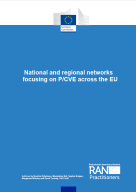Details
- Publication date
- 3 July 2024
- Author
- Directorate-General for Migration and Home Affairs
- RAN Publications Topic
- Violent right-wing extremism
Description
The responsibility for preventing and countering radicalisation lies with the individual EU Member States (MSs). Considering the nature of the threat posed by terrorism and violent extremism, it is the task of EU-level policies and collaboration to support national networks, coordination centres and expertise. This was emphasised by the Counter-Terrorism Agenda for the EU 2020 and its stated intention to support the creation and further development of national networks. In order to support them and build partnerships, it is necessary to recognise and map such national and regional networks, to identify further areas of collaboration between them and the EU level. In 2022, the Radicalisation Awareness Network - RAN Practitioners already started to map parts of these structures.
In 2024, RAN carried out another mapping to get a more elaborate understanding of the exact types of structures and their scope in all EU MSs. This could be of significant benefit to increase the impact of EU-level support to European first-line practice. This paper presents the results of the mapping of national and regional networks working on preventing and countering violent extremism (P/CVE) in the EU. The focus was on networks facilitating knowledge and practice exchange on P/CVE within EU MSs. It further offers a categorisation of existing networks of practitioners, policymakers, researchers (including mixed networks) and coordination mechanisms, inter alia, aimed at strengthening P/CVE practice across the EU.
This categorisation briefly discusses purposes/objectives of these networks along with first ideas on potential mutual benefits of closer cooperation with RAN and the future EU Knowledge Hub on prevention of radicalisation. This paper serves to improve the knowledge base and impact of collaboration of RAN and from September 2024 onwards the Knowledge Hub with national and regional P/CVE networks in EU MSs. It is also intended to act as a resource for P/CVE practitioners and programme managers to identify further networks to engage in.
Finally, this paper formulates recommendations for continuity of this mapping effort and expansion of the repository of identified networks, as well as for potential collaboration and engagement of identified networks within the activities of the Knowledge Hub while taking into account the guidelines of national contact points1 to ensure better outreach to stakeholders at national and local levels and dissemination of knowledge and expertise.

